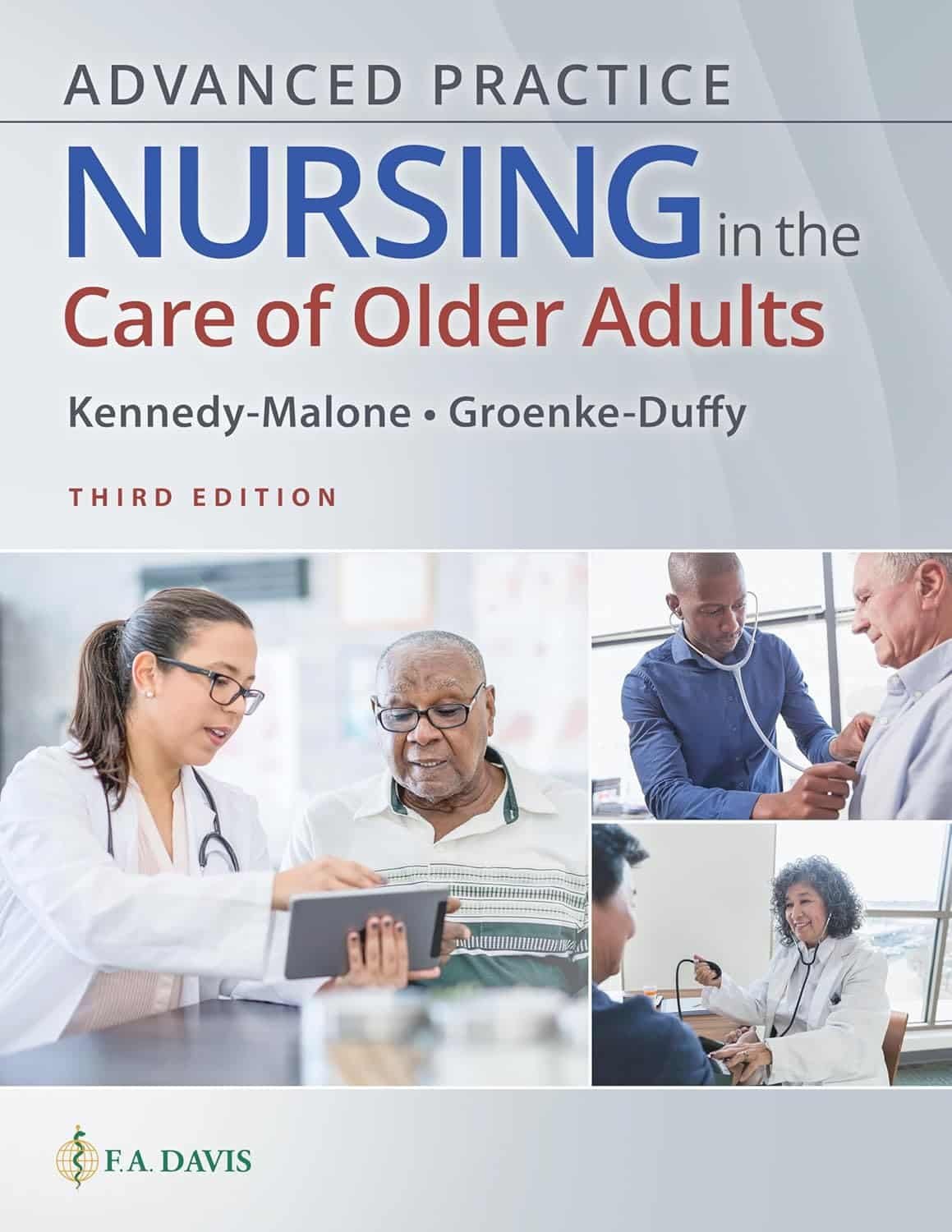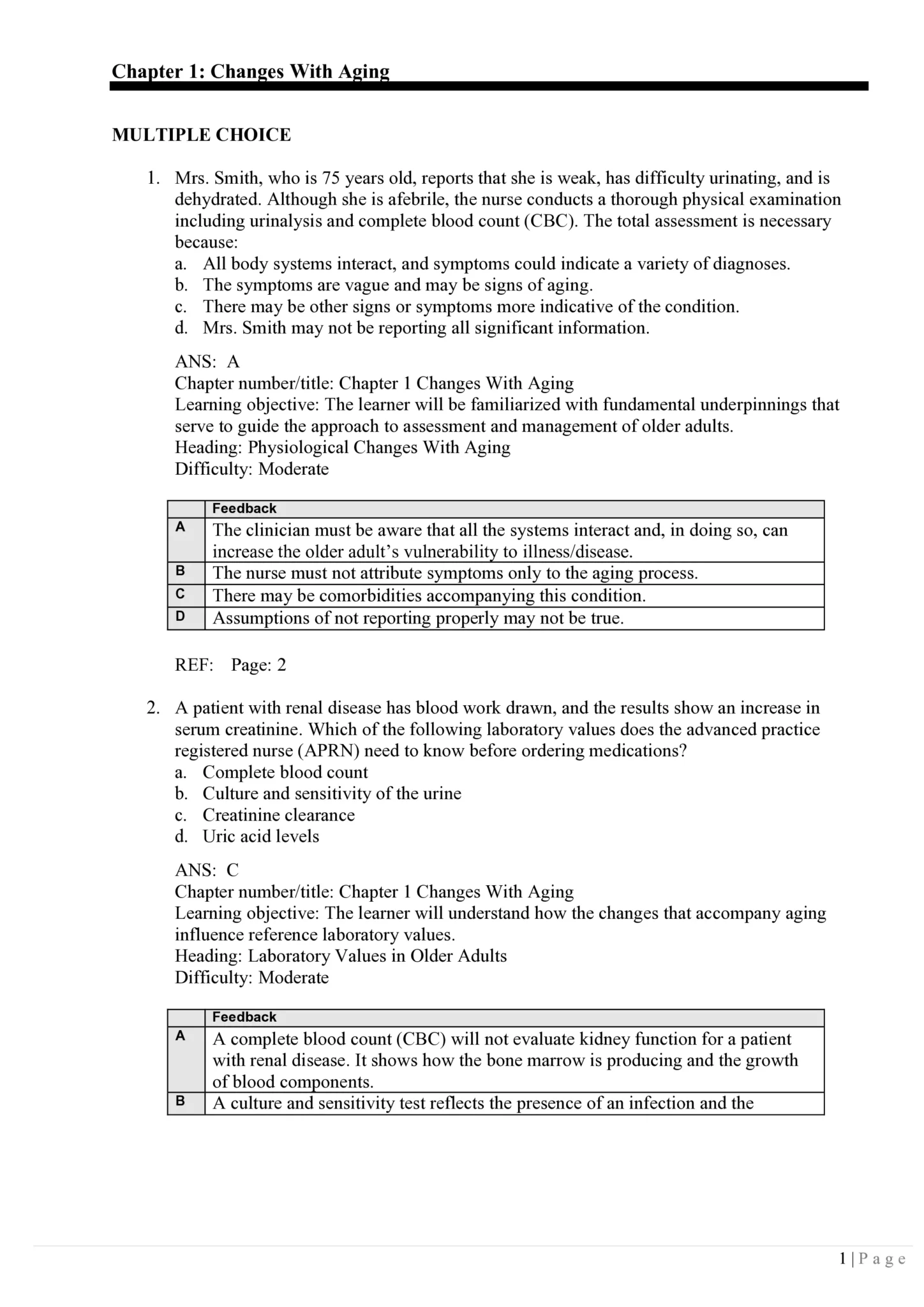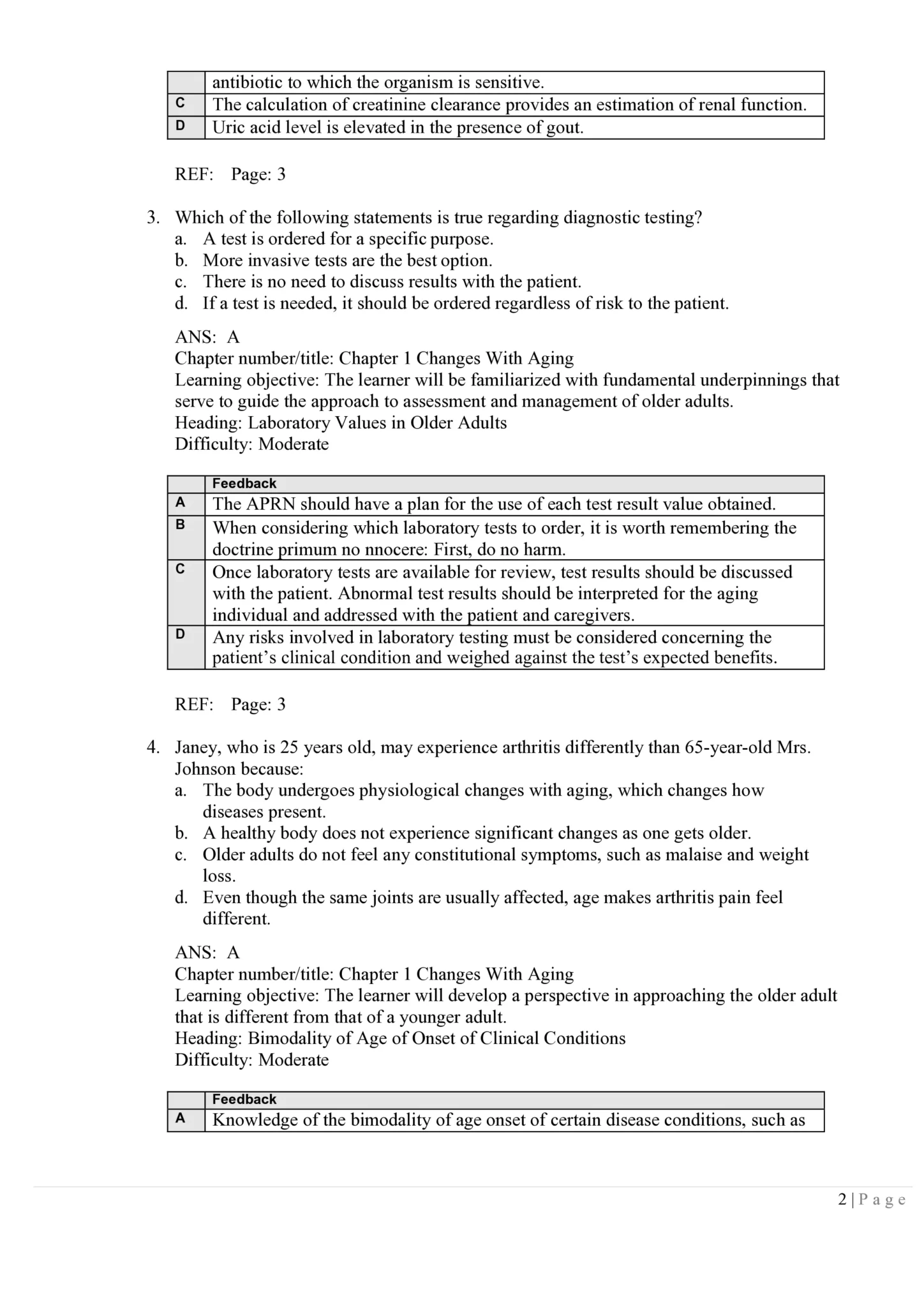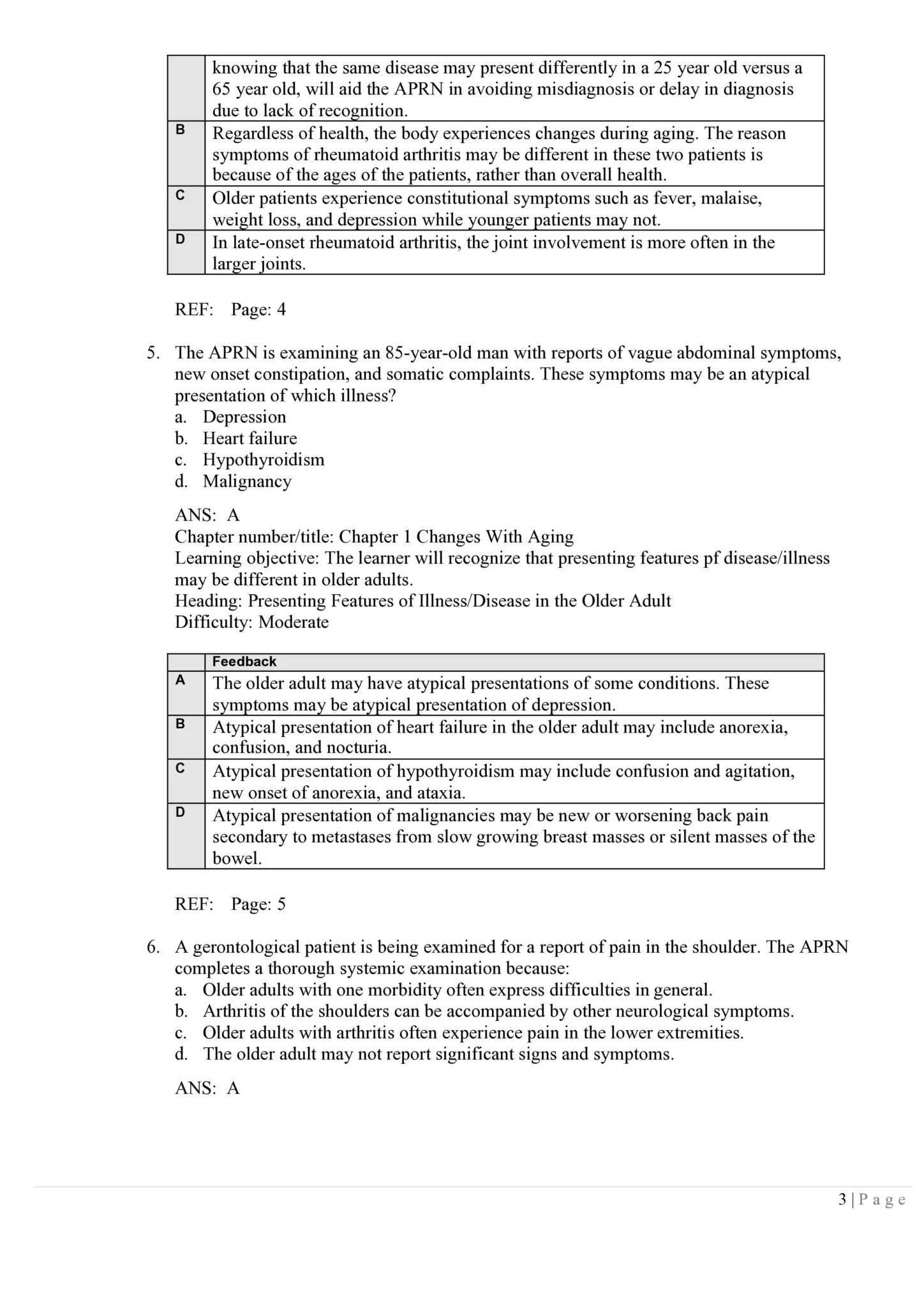Test Bank for Advanced Practice Nursing in the Care of Older Adults, 3rd Edition
$26.00 Original price was: $26.00.$23.00Current price is: $23.00.
Instant PDF Download – Access Immediately After Checkout.
The Advanced Practice Nursing in the Care of Older Adults, 3rd Edition Test Bank by Laurie Kennedy-Malone & Evelyn Duffy features over 1,000 NCLEX®-style, AGNP, and DNP-level questions with detailed rationales and textbook page references. Ideal for Adult-Gerontology NP programs, MSN/DNP prep, and faculty exam design.
- All 23 chapters + bonus infectious disease section
- Multiple-choice & case-based questions with difficulty levels
- Aligned with Advanced Practice Nursing in the Care of Older Adults, 3rd Edition
- Downloadable, searchable, and printable PDF format

Description
Test Bank for Advanced Practice Nursing in the Care of Older Adults (3rd Edition) provides expertly written clinical and theory-based questions aligned with the textbook by Laurie Kennedy-Malone & Evelyn Duffy. Designed for AGNP, DNP, and MSN nursing students, this test bank strengthens diagnostic reasoning, geriatric assessment, and evidence-based decision-making.
Each question includes verified answers, rationales, difficulty level, and chapter reference—covering key areas such as physiological aging, health promotion, chronic illness, palliative care, and pharmacologic management in older adults. Ideal for use in graduate nursing programs, certification review, and classroom testing.
Table of Contents – Chapters Covered
- Chapter 1: Changes With Aging
- Chapter 2: Health Promotion
- Chapter 3: Exercise in Older Adults
- Chapter 4: Nutritional Support in the Older Adult
- Chapter 5: Settings of Care
- Chapter 6: Comprehensive Geriatric Assessment
- Chapter 7: Symptoms and Syndromes
- Chapter 8: Dermatological Disorders
- Chapter 9: Head, Neck, and Face Disorders
- Chapter 10: Cardiovascular Disorders
- Chapter 11: Respiratory Disorders
- Chapter 12: Peripheral Vascular Disorders
- Chapter 13: Gastrointestinal Disorders
- Chapter 14: Urological and Renal Disorders
- Chapter 15: Gynecological Disorders
- Chapter 16: Musculoskeletal Disorders
- Chapter 17: Central and Peripheral Nervous System Disorders
- Chapter 18: Endocrine and Metabolic Disorders
- Chapter 19: Hematological Disorders
- Chapter 20: Psychosocial Disorders
- Chapter 21: Polypharmacy
- Chapter 22: Chronic Illness and the APRN
- Chapter 23: Palliative and End-of-Life Care
- Bonus Chapter: Infectious Disease
Sample Questions — Chapter 1: Changes With Aging
MULTIPLE CHOICE
1. Mrs. Smith, who is 75 years old, reports that she is weak, has difficulty urinating, and is dehydrated. Although she is afebrile, the nurse conducts a thorough physical examination
including urinalysis and complete blood count (CBC). The total assessment is necessary because:
a. All body systems interact, and symptoms could indicate a variety of diagnoses.
b. The symptoms are vague and may be signs of aging.
c. There may be other signs or symptoms more indicative of the condition.
d. Mrs. Smith may not be reporting all significant information.
ANS: A
Chapter number/title: Chapter 1 Changes With Aging
Learning objective: The learner will be familiarized with fundamental underpinnings that serve to guide the approach to assessment and management of older adults.
Heading: Physiological Changes With Aging
Difficulty: Moderate
Feedback
A The clinician must be aware that all the systems interact and, in doing so, can increase the older adult’s vulnerability to illness/disease.
B The nurse must not attribute symptoms only to the aging process.
C There may be comorbidities accompanying this condition.
D Assumptions of not reporting properly may not be true.
REF: Page: 2
2. A patient with renal disease has blood work drawn, and the results show an increase in serum creatinine. Which of the following laboratory values does the advanced practice
registered nurse (APRN) need to know before ordering medications?
a. Complete blood count
b. Culture and sensitivity of the urine
c. Creatinine clearance
d. Uric acid levels
ANS: C
Chapter number/title: Chapter 1 Changes With Aging
Learning objective: The learner will understand how the changes that accompany aging influence reference laboratory values.
Heading: Laboratory Values in Older Adults
Difficulty: Moderate
Feedback
A A complete blood count (CBC) will not evaluate kidney function for a patient
with renal disease. It shows how the bone marrow is producing and the growth
of blood components.
B A culture and sensitivity test reflects the presence of an infection and the
antibiotic to which the organism is sensitive.
C The calculation of creatinine clearance provides an estimation of renal function.
D Uric acid level is elevated in the presence of gout.
REF: Page: 3
3. Which of the following statements is true regarding diagnostic testing?
a. A test is ordered for a specific purpose.
b. More invasive tests are the best option.
c. There is no need to discuss results with the patient.
d. If a test is needed, it should be ordered regardless of risk to the patient.
ANS: A
Chapter number/title: Chapter 1 Changes With Aging
Learning objective: The learner will be familiarized with fundamental underpinnings that serve to guide the approach to assessment and management of older adults.
Heading: Laboratory Values in Older Adults
Difficulty: Moderate
Feedback
A The APRN should have a plan for the use of each test result value obtained.
B When considering which laboratory tests to order, it is worth remembering the doctrine primum no nnocere: First, do no harm.
C Once laboratory tests are available for review, test results should be discussed with the patient. Abnormal test results should be interpreted for the aging
individual and addressed with the patient and caregivers.
D Any risks involved in laboratory testing must be considered concerning the patient’s clinical condition and weighed against the test’s expected benefits.
REF: Page: 3
Why Choose This Test Bank
- Aligned to every chapter in the 3rd Edition, including bonus infectious disease content.
- Strengthens clinical judgment for AGNP coursework, OSCEs, and certification prep.
- Each item includes answers, rationales, difficulty level, and references.
Advanced Practice Nursing in the Care of Older Adults 3rd Edition — FAQs
1) What’s included in the Advanced Practice Nursing in the Care of Older Adults 3rd Edition Test Bank (PDF)?
This test bank includes chapter-organized multiple-choice and clinical scenario questions with detailed rationales covering all 23 core chapters and the bonus infectious disease section. Topics span aging physiology, health promotion, chronic illness, palliative care, and evidence-based gerontological practice.
2) Does this follow the exact textbook sequence by Kennedy-Malone & Duffy?
Yes. The test bank mirrors the official 3rd Edition textbook layout from Chapter 1 (Changes With Aging) through Chapter 23 (Palliative and End-of-Life Care), ensuring perfect alignment for course study and faculty use.
3) How do I access the test bank after purchase?
You’ll receive an instant digital download in secure PDF format immediately after checkout. The file is fully searchable, printable, and compatible with all devices — laptop, tablet, or mobile.
4) Who can benefit most from this resource?
This test bank is ideal for Adult-Gerontology Nurse Practitioner (AGNP) students, DNP candidates, nursing faculty, and clinicians seeking to strengthen advanced practice skills in geriatric care, chronic disease management, and interdisciplinary assessment.
5) Are rationales and difficulty levels included for each question?
Yes. Each item provides a verified answer, evidence-based rationale, difficulty level, and reference to the corresponding textbook page — ideal for exam prep and classroom evaluation design.
Related products
-
Sale!

Test Bank for Lehninger Principles of Biochemistry, 8th Edition
0 - 0 reviews$26.00Original price was: $26.00.$23.00Current price is: $23.00. Add to cart -
Sale!

Test Bank for Foundations of Maternal-Newborn and Women’s Health Nursing, 8th Edition
0 - 0 reviews$26.00Original price was: $26.00.$23.00Current price is: $23.00. Add to cart -
Sale!

Test Bank for Davis Advantage for Basic Nursing: Thinking, Doing, and Caring, 3rd Edition by Leslie S. Treas, Karen L. Barnett & Mable H. Smith
0 - 0 reviews$26.00Original price was: $26.00.$23.00Current price is: $23.00. Add to cart -
Sale!

Test Bank for Discovering the Life Span, 5th Edition by Robert S. Feldman
0 - 0 reviews$26.00Original price was: $26.00.$23.00Current price is: $23.00. Add to cart







